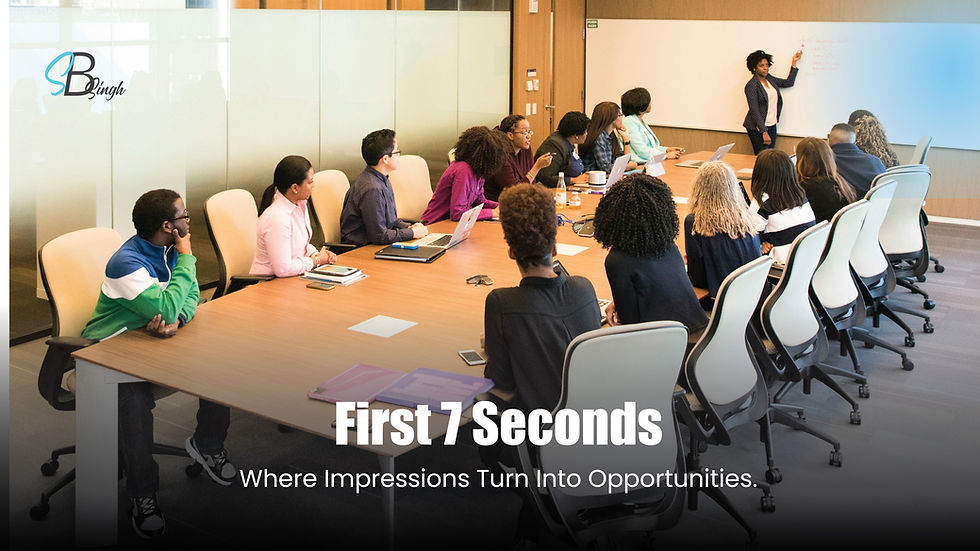Beyond the Resume: The Power of Soft Skills
- shashibhushanmb
- May 5
- 3 min read

Ever heard the saying "hard skills get you hired, but soft skills get you promoted"? It's a catchy phrase, but honestly, it's got a whole lot of truth packed into it. We often put so much emphasis on those tangible, measurable skills – the ones listed in the "Skills" section of your resume. But let's be real, in today's world, those "squishy" soft skills are turning out to be the real MVPs.
Think about it. You can be the absolute coding wizard, the marketing guru with all the latest certifications, or the financial analyst who can crunch numbers in their sleep. Those hard skills are your ticket to the game, no doubt. They prove you have the foundational knowledge to do the job. But what happens when you actually start the job? That's where the magic of soft skills truly shines.
Let's take an example. Imagine two equally skilled web developers. Both can write flawless code, debug like pros, and understand all the latest frameworks. Developer A, however, struggles to explain their ideas to non-technical team members, gets easily frustrated when there are roadblocks, and prefers to work in complete isolation. Developer B, on the other hand, is a fantastic communicator, patiently explaining complex concepts in simple terms. They're also great at collaborating, bouncing ideas off others, and maintaining a positive attitude even when things get tough.
Who do you think will be more successful in the long run? Who will be the go-to person on the team? Who will likely get those leadership opportunities? My bet's on Developer B, and it's all thanks to those crucial soft skills.

Soft skills, at their core, are about how you interact with others and navigate the workplace. They're the interpersonal abilities, the emotional intelligence, and the personal attributes that shape your relationships and your overall effectiveness. We're talking about things like:
Communication: Not just about speaking clearly, but also actively listening, understanding non-verbal cues, and tailoring your message to your audience.
Teamwork: The ability to collaborate effectively, share responsibilities, and support your colleagues to achieve common goals.
Problem-solving: Approaching challenges with a positive mindset, thinking critically, and finding creative solutions.
Adaptability: Being flexible and open to change, learning new things quickly, and adjusting to evolving circumstances.
Emotional Intelligence: Understanding and managing your own emotions, as well as recognizing and responding empathetically to the emotions of others.
Time Management: Organizing your work efficiently, prioritizing tasks, and meeting deadlines consistently.
Leadership: Inspiring and motivating others, providing guidance, and fostering a positive team environment (even without a formal title).
Now, why do these seemingly "soft" things matter more than the "hard" ones? Here's the deal:
People are at the heart of everything: No matter how technically brilliant you are, you'll likely be working with other people – colleagues, clients, stakeholders. Your ability to build rapport, communicate effectively, and work collaboratively directly impacts your success and the success of the team.
Technology changes, but people remain: Hard skills can become outdated quickly in our rapidly evolving world. New software emerges, coding languages evolve, and industry best practices shift. While continuous learning of hard skills is essential, those fundamental soft skills – like the ability to learn, adapt, and communicate – remain valuable no matter the technological landscape.
Soft skills drive innovation and creativity: When people feel comfortable communicating openly, sharing ideas, and collaborating effectively, it fosters an environment where innovation can thrive. Brainstorming sessions become more productive, and diverse perspectives lead to more creative solutions.
Leadership is all about people skills: As you climb the career ladder, your technical expertise becomes less about individual execution and more about leading and motivating others. Soft skills like empathy, communication, and conflict resolution become absolutely critical for effective leadership.
They make you a better human: Beyond the workplace, strong soft skills contribute to healthier relationships, better personal communication, and overall well-being. They're not just "work skills"; they're life skills.

So, while it's crucial to invest in developing your hard skills to get your foot in the door, don't underestimate the power of those seemingly less tangible soft skills. They are the glue that holds teams together, the engine that drives collaboration, and the key to long-term success in any field. Start honing those communication skills, practice active listening, embrace teamwork, and watch how far you can go. Trust me, in the grand scheme of things, those soft skills are anything but soft – they're your superpower!
Learn more about our Business Communication Course.
Has there ever been a time when Soft Skills have helped you out in your career? Let us know in the comments!



Comments